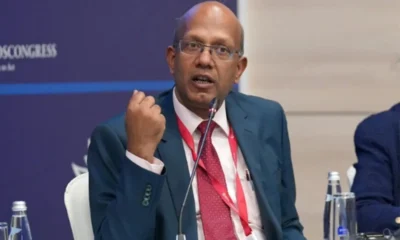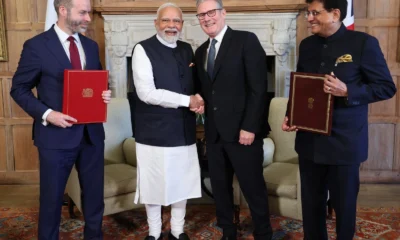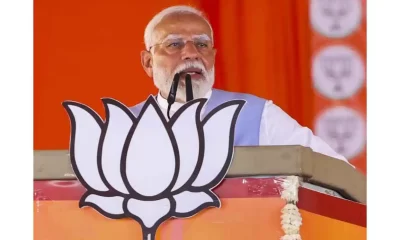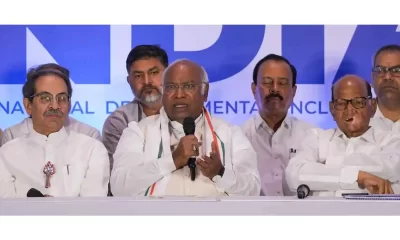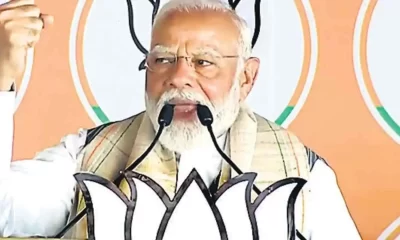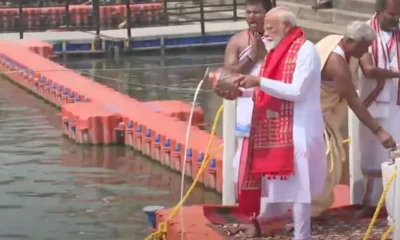[vc_row][vc_column][vc_column_text]
Expressing hope that India would lift trade barriers, US Secretary of State Michael Pompeo hinted that it was possible to reinstate the Generalized System of Preferences (GSP), a programme for preferential access to certain goods markets in the US, for India.
Pompeo is expected to discuss this as well as 5G network technology and data localisation while in New Delhi later this month on a visit. He will travel to India, Sri Lanka, Japan and South Korea from June 24 to 30. Mike Pompeo’s four-nation tour is aimed at deepening US partnerships in the strategic Indo-Pacific region.
Putting his own spin on the BJP poll slogan, Pompeo, in a speech at the India Ideas Summit of US-India Business Council on Wednesday, June 12, said: “As Prime Minister (Narendra) Modi said in his latest campaign, ‘Modi hai to mumkin hai,” or ‘Modi makes it possible”, I am looking forward to explore what’s possible between the US and India.”
“I am very much looking forward to my trip to New Delhi later this month, and meeting PM Modi, and my new counterpart, External Affairs Minister S Jaishankar,” he said.
Mike Pompeo listed out some of the “big ideas and big opportunities” that can take bilateral relationship between US and India to a new level.
He said differences between the two countries remain in some of the key trade and business issues, he acknowledged. “We’ll probably discuss the recent decision about the GSP program…we remain open to dialogue, and hope that our friends in India will drop their trade barriers and trust the competitiveness of their own companies, their own businesses, their own people and private sector companies,”
In addition to GSP, data localisation regulations and proposed policies have been a source of friction between the two countries.
“We’ll also push for free flow of data across borders, not just to help American companies, but to protect data and secure consumers’ privacy,” Pompeo said.
“And speaking of privacy, we are eager to help India establish secure communications networks — including 5G networks as well,” Pompeo said.
The Trump administration is pushing its allies and partner countries to block the Chinese telecom giant Huawei from participating in building their next generation (5G) telecommunication networks and has put Huawei on a trade blacklist for US companies.
Pompeo went to some lengths to stress that the US understood India’s post-Independence economic history and current geopolitical realities, Pompeo touched on a common theme — a India-US partnership based on values.
India and the US, he said, must embrace the strategic framework that works for both the nations. “We get it. We respect India as a sovereign power, with its own unique politics and strategic challenges. We realize it’s different to deal with the likes of China and Pakistan from across the ocean than it is when they are on your borders. That’s why in this room and not so many months ago, I elaborated on President Trump’s vision for a free and open Indo-Pacific,” Pompeo said.
Giving a preview of his India mission, he said he truly believes the two nations have a unique opportunity to move forward together for the good of their people, the Indo-Pacific region, and the world.
Making a strong case for a free and open Indo-Pacific, he said it starts from the premise that the two share common values of democracy, freedom, and a belief in the ingenuity of the human spirit. “It’s only natural that the world’s most populous democracy should partner with the world’s oldest democracy to maintain their shared vision for the Indo-Pacific.”
“Third, we have to deliver,” Pompeo said.
He said under President Donald Trump, the US has taken defence cooperation to newer heights, solidified their common vision for the Indo-Pacific and taken a far tougher stand on Pakistan’s unacceptable support for terrorism.
“Forging strong ties means formalizing these individual friendships. Last year, we kicked off the ‘2+2 dialogue’ alongside the Department of Defence. We’ve also reinvigorated the Quad Dialogue among India, the United States, Japan, and Australia – all like-minded democracies in the Indo-Pacific. These are all good steps,” he said.
The Trump Administration has already enabled American companies to export more high technology items to India, including cutting-edge defence platforms like armed UAVs and ballistic missile defence systems. “We’ve already launched the Asia-EDGE programme, to help India raise private capital to meet its energy security and access needs,” he said.
“These are solid achievements, but we want to do much more. We clearly have overlapping interests in defence, energy, and space,” he said.
Mike Pompeo said the first batch of India’s Apache helicopters are coming off Boeing’s production line in Arizona. Lockheed Martins F-21 and Boeing’s F/A-18 are state-of-the-art fighters that could give India the capabilities it needs to become a full-fledged security provider in the strategic Indo-Pacific region.
On space, NASA is already working with the Indian Space Research Organisation on the world’s most advanced earth-observation satellite and India’s second lunar mission.
Pompeo also used the dais to make a pitch for US crude oil and natural gas during a question answer session with LNG company Tellurian’s CEO, Meg Gentle.
“On energy, we want to complete the Westinghouse civil nuclear project, and deliver more American LNG and crude,” he said adding that these steps will give Indians reliable and abundant energy and help reduce dependence on regimes like Iran and Venezuela.
“We’ve been blessed with abundant affordable energy right here in the United States, and we’re now out producing it at enormous levels, not just crude oil but natural gas as well,” Pompeo said, adding that the U.S. would need to ensure that it had the infrastructure for delivery.
Under threat of US sanctions, India had, reluctantly, stopped oil imports from Venezuela and Iran, India’s ambassador to the US Harsh Vardhan Shringla told the press at the end of May. On Monday, Petroleum Minister Dharmendra Pradhan spoke with U.S. Energy Secretary Rick Perry about volatile oil prices and energy security.
“They [buyers of US fuel] can have a fully diversified energy portfolio where they don’t have to rely on nations that aren’t as reliable as the United States,” Pompeo said.[/vc_column_text][/vc_column][/vc_row]


 India News12 hours ago
India News12 hours ago
 India News11 hours ago
India News11 hours ago
 India News2 hours ago
India News2 hours ago
 Cricket news1 hour ago
Cricket news1 hour ago
 India News26 mins ago
India News26 mins ago
